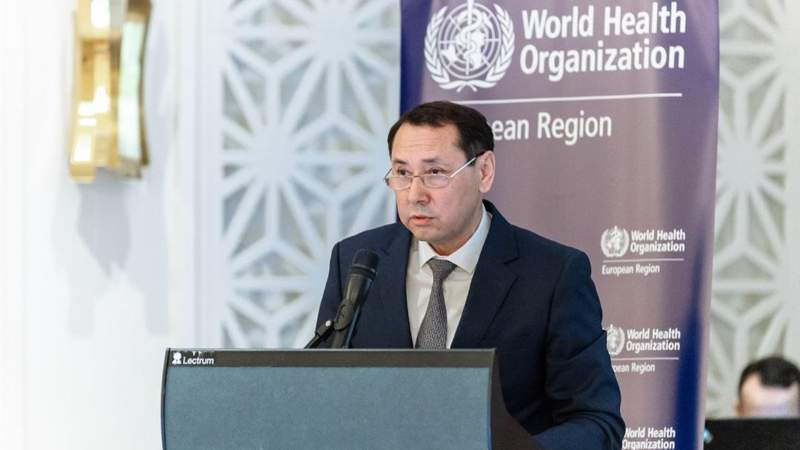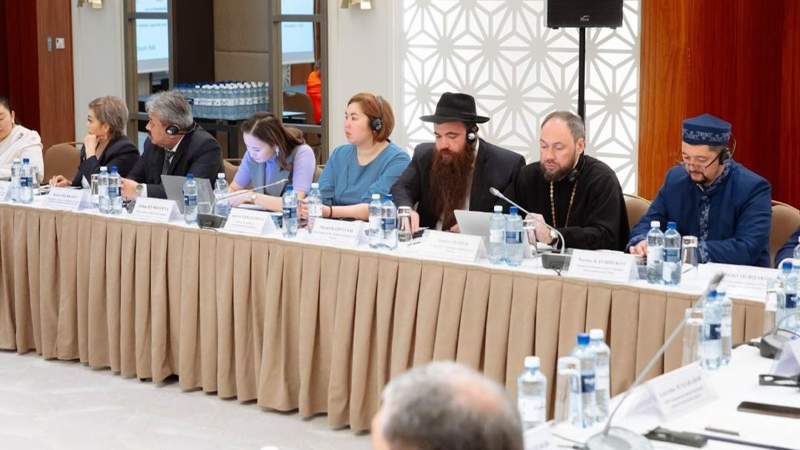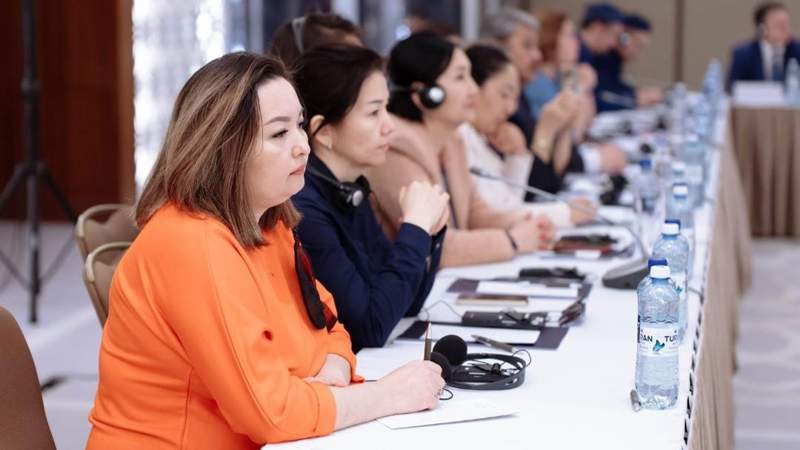Kazakhstan undertakes over 2,500 organ transplant operations in 10 years

The latest data from the Kazakh Ministry of Healthcare shows that over the past 10 years, more than 2,500 organ transplant operations have been performed in Kazakhstan. 83% of all surgeries were performed using organs from living donors, while 17% were performed using organs from posthumous donors, Kazinform News Agency correspondent reports.
The development of the national system of organ donation and transplantation in Kazakhstan continues at an active pace.
Seven transplant centers and 40 donor organizations are operating in the country, which provide assistance in preparing a posthumous donor for multi-organ donation for transplantation.
Process of transplantation and donation in Kazakhstan
In an interview with Kazinform, Dr. Aidar Sitkazinov, director of the National Center for Coordination of Transplantation and High-Tech Medical Services, outlined the intricate process of donor and recipient selection in Kazakhstan.

Regional coordinators are briefed on patients in coma who are diagnosed with brain death. They check the patient's consent, if available, followed by a consultation to confirm brain death and engage relatives in the decision for organ transplantation.
Upon consent, transplant centers initiate the procedure, examining the patient for infections before determining recipients (kidneys, liver) from a waiting list via an information system.
Organs are then extracted by a specialized team via air ambulance, undergoing necessary procedures, including biopsy, before being transported to transplant centers for relevant organ transplant operations.
On March 10, the Ministry of Health of Kazakhstan announced the transplantation of organs from one donor to three patients located in different regions of the country. The procedures were carried out by a highly qualified team of doctors at the National Scientific Oncology Center and Cardiac Surgery Center in Astana.
A team of doctors went to the Pavlodar region, where an organ transplant operation took place. At the same time, additional tests were carried out in Astana to select recipients. A 26-year-old patient undergoing hemodialysis due to end-stage renal (kidney) disease was identified as one of the recipients.
At the National Scientific Oncology Center in Astana, a deceased-donor kidney transplant was successfully performed on an adult patient, and a kidney was transplanted to a child at the Center for Maternity and Childhood. The heart transplant operation for the third patient was performed at the Cardiac Surgery Center.
According to the center, as of April 10, 4,085 patients are on the waiting list, and 104 of them are children.
Perspective of religion
One of the obstacles preventing organ donation and transplantation in Kazakhstan can be religious and social factors. At the World Health Organization seminar on April 16 in Astana that focused on the ethics of organ transplantation, representatives of three religious faiths, Islam, Christianity and Judaism, expressed their opinions on the topic of donation. They emphasized that the main moral and ethical issue is determining the exact moment of a person’s death. They explained that a board of religious scholars should clarify this.

“The Spiritual Administration of Muslims of Kazakhstan states that the transportation of organs is generally permitted. However, such an action must be carried out in accordance with certain conditions without abusing the person. First of all, the religion of Islam says that we should always take care of people and treat them fairly and with respect,” said a representative of Islam.
The conditions for such a medical procedure were also announced. Organ transplantation must be justified, priority must be given to alternative treatments, and the operation must be successful and safe for all parties.
Organs should not be sold, and helping people should be the main motive. The decision to transplant should be made only after a thorough assessment by a commission of specialists. These principles reflect the position of scientists from the Spiritual Administration of Muslims of Kazakhstan and should be taken into account in decisions on organ transplantation.
The representative of Christianity expressed his opinion by explaining that the Christian tradition does not prohibit donation, which emphasizes its importance in saving lives. He stressed that there is a need to conduct an awareness campaign on donation and its ethical aspects to raise public awareness.
“This is very difficult, this is a very precise process, and people need to know and understand and this is happening in our world. Many people do not know what they consider the death of a person, the state of the heart, the activity of the brain, how such decisions are made. (...) If there was such an information campaign, it seems to me that there would be fewer refusals,” he said.
Organ transplants raise spiritual and ethical questions, according to Judaism. A representative of Judaism emphasizes that the Almighty must make life and death decisions. He recognizes the importance of transplantation but believes it should be voluntary and safe.
“We need to weigh the risks, as it was said, we need to check what it affects, how it affects, whether a person can give, whether he wants to give, it must be voluntary,” he said.
He supported family transplants, which are voluntary and save lives, but denounced withholding life support as murder.
“Stopping the life-basis system, that is, the support of the heart, even with the consent of the person, even if he [or she] himself wants to stop it, as soon as his [or her] brain warms up, stop it, hand it over to them outside the window, the person who does this will be considered differently. The person who stops the car will be considered killed,” he said.
It is important to control the process to avoid illegal actions strictly. He expresses hope for the development of medical technologies that will help resolve this difficult ethical dilemma.

Worldwide organ donation practices
According to the 2022 report from the International Registry in Organ Donation and Transplantation, Spain, the United States, and Iceland are the three leading countries in terms of the worldwide actual deceased organ donor rate.
Kazakhstan shows results of 0.20 with no percentile improvement or decline in comparison with 2021.
In her presentation during the seminar, Beatriz Dominguez-Gil, the general director of Spain's National Transplant Organization, unveiled remarkable statistics and insights into Spain's organ donation system.
Dominguez-Gil revealed that in 2023, Spain performed more than 8,800 transplants, boasting a rate of 122 transplants per million population. She emphasized the sustained success over the years, noting that the country consistently performs well over 100 transplant procedures annually.
Spain's organ donation system operates under unique legislation enacted in 1979, which stipulates that every individual who dies in Spain is considered an organ donor by default unless they have expressly opted out during their lifetime.
“The procedure that we follow, and that is detailed in the secondary legislation, the coordinator will almost explore the advanced genetics registry, which we have in place to record, among others, the wishes about customs donation. With that information, the coordinator will be approaching relatives to find out whether a donation would be consistent with the individual's wishes and values, but in the end, if the family opposes an organ donation, an organ recovery will not proceed. So, in practice, the family always has the final bidder. (…) If we have to summarize the Spanish model with just one word, we would use the word organization or management of the highly complex process of this donation,” she said.
Central to Spain's success is its meticulously organized transplant infrastructure.
Dominguez-Gil highlighted the requirement that every hospital have a dedicated donor transplant coordination unit, which would ensure a standardized approach across the country.
Spain’s National Transplant Organization is operated through 17 regional offices.
“We are a 48 billion country. We have 185 hospitals with authorization for organ recovery, and hence, we have a donor transplant coordination unit. In total, we have about 600 coordinators devoted to this activity, and as you can see, most of them are physicians, 63% of them, and most of them come from the ICU,” she said.
Additionally, national and regional offices provide continuous training, information, and guidance to hospital units, facilitating ongoing improvements in organ donation practices.
Strategic alliances with critical care societies play a vital role in engaging healthcare professionals in the organ donation process. By collaborating closely with intensive care, emergency care, and anesthesiology societies, Spain ensures that professionals receive specialized training and adhere to professional standards, thereby promoting research and innovation in the field.
Spain's commitment to professional development is evident through its substantial investment in training initiatives. With an annual budget of approximately €1 million, various hospitals, organizations, and foundations offer training programs to thousands of healthcare and non-healthcare professionals each year, aligning with strategic objectives set by the National Transplant Organization.
In reaching out to the public, Dominguez-Gil explained that Spain prioritizes collaboration with the mass media. Rather than investing in public campaigns, the organization works closely with journalists, providing them with direct access to information and innovations in the field. Annual meetings with journalists serve as platforms for addressing concerns and sharing insights, fostering greater public awareness and understanding of organ donation issues.
She also shared that Spain's successful model has not only inspired replication efforts in countries like Australia and Croatia but has also led to significant advancements in Latin America. Collaborative efforts have resulted in a doubling of transplantation activities in the region since 2005, underscoring the effectiveness of Spain's governance and capacity-building initiatives.
Dominguez-Gil also discussed the concept of intensive care for organ donation, emphasizing its ethical considerations and role in facilitating donations in patients with devastating brain injuries.
“We have been working on the concept of intensive care to facilitate organ donation, defined as the initiation or continuation of intensive care measures in patients with devastating brain injury, in whom intensive care with a therapeutic purpose is not indicated, or grounds of futility, in order to pose the possibility of organ donation in the rate-of-life care plans,” she said.
In his speech at the seminar, Riadh Fadhil, director of Qatar's Organ Donation Center, spoke about the role of Islam in organ donation using Qatar as an example.
“Organ donation is a new topic in the field of medicine. It was not present at the time of initiation of religious doctrine, prophets or gurus,” he said.
Fadhil highlighted the presence of both proponents and opponents within communities.
Nevertheless, he shared promising statistics, noting that between 2011 and 2017, 29% of actual disease donors were Muslim.
“Now, it is 41%, showing consistent growth,” he added.
Despite religious reservations, Fadhil expressed optimism about increasing acceptance, respecting individual beliefs.
Fadhil also emphasized the significance of a comprehensive fatwa gathered from scholars across the Arab world, which guides decisions at the Ministry of Religious Affairs and influences legislative measures supporting organ donation.
